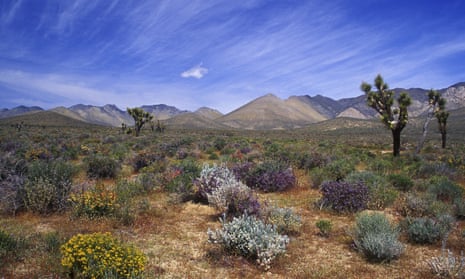Barack Obama is to nearly double the amount of public land he has protected as national monuments, by signing off on the conservation of nearly 1.8m acres (0.7m hectares) of California desert.
The three new national monuments designated by President Obama – the Mojave Trails national monument, Sand to Snow national monument and Castle Mountains national monument – will further burnish the president’s reputation for using executive action to protect vast tracts of public land and water.
Obama has now protected more land and water – at more than 265m acres – than any other president, although a large chunk of this total is found in a network of marine reserves in the Pacific. The president has used the Antiquities Act 22 times, placing him behind only Franklin D Roosevelt, who spent longer in office.
Mojave Trails is the largest single land monument yet declared by Obama. The 1.6m-acre wilderness is composed of mountain ranges, lava flows and sand dunes. The area is considered historically significant as it includes ancient trading routes, training camps from the second world war and the longest remaining undeveloped stretch of route 66.
The Sand to Snow monument is one of the most biodiverse areas in southern California, hosting more than 240 species of birds. It also includes about 1,700 native American rock carvings and the region’s tallest alpine mountain.
The Castle Mountains monument is an important site for Native American heritage, as well as a critical wildlife corridor for golden eagles, mountain lions and bobcats.
The White House said the listings, which follow a conservation campaign by California senator Dianne Feinstein, are widely supported by local businesses, tribal groups and elected officials. The Obama administration also insists its policy of designating national monuments is economically beneficial, pointing to the $646bn spent each year by visitors to America’s wilderness areas.
“The California desert is a cherished and irreplaceable resource for the people of southern California,” said Sally Jewell, the US interior secretary.
“It is an oasis of nature’s quiet beauty just outside two of our nation’s largest metropolitan areas. Its historic and cultural resources tell the stories of armies, travelers, ranchers and miners and of the original caretakers of this land.”
Jamie Rappaport Clark, chief executive and president of Defenders of Wildlife, said: “National monument status guarantees the conservation of unique ecological, recreational and economic benefits of landscapes far into the future.
“President Obama’s inclusion of the California desert is particularly important since this desert is the most intact, undisturbed landscape left unprotected in the Lower-48 [states].”
Theodore Roosevelt was the first president to use the Antiquities Act to declare a national monument, protecting Devils Tower in Wyoming in 1906. There are more than 100 national monuments across the US.
Obama’s use of this executive action has, however, been controversial among Republicans who claim that economically valuable land has been sidelined.
Earlier this month, the Senate rejected an attempt by Republican senator Mike Lee to limit the president’s ability to name new national monuments without congressional and state approval.
Lee, from Utah, said the use of the act has resulted in “government-sponsored injustice and bureaucratic tyranny”.

Comments (…)
Sign in or create your Guardian account to join the discussion